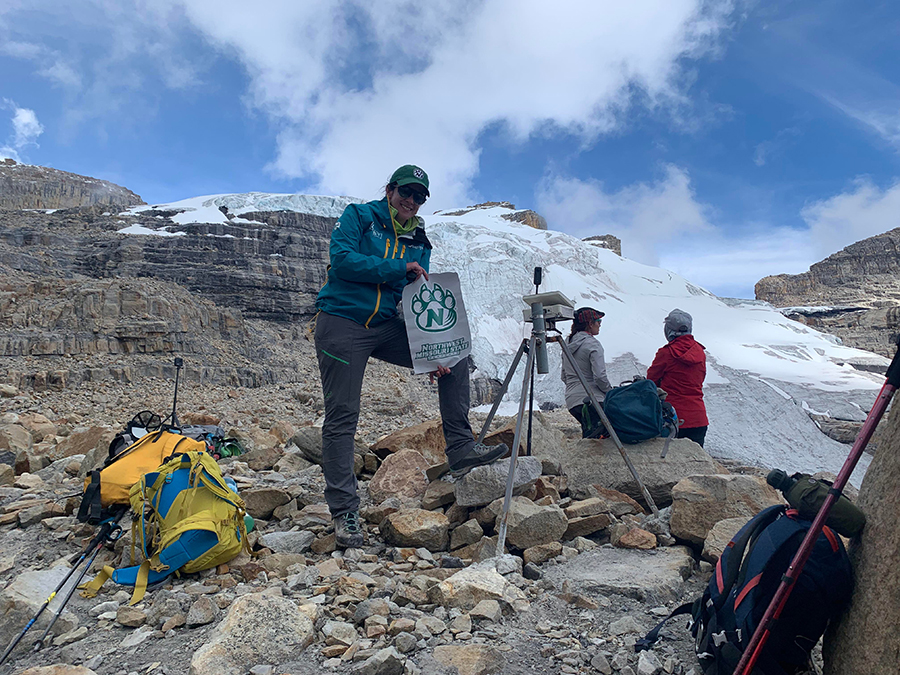
Dr. Nina Adanin, an assistant professor of recreation, displays a Bearcat flag while conducting research of disappearing tropical glaciers in Colombia and Uganda. (Submitted photo)
A Northwest Missouri State University faculty member is the co-creator of an ongoing research project documenting disappearing glaciers in tropical regions, helping students better understand the impacts of the glaciers’ disappearance on the environment and the sport and recreation field in the process.
Dr. Nina Adanin, an assistant professor of recreation, cooperated last winter with Dr. Heïdi Sevestre, a French glaciologist at the Arctic Monitoring and Assessment Programme (AMAP), and a team of scientists to examine the disappearance of tropical glaciers in Colombia and Uganda.
Their research of glaciers began in the Arctic, and their ongoing efforts to raise awareness of tropical glaciers and water resources led them to Colombia and Uganda. Adanin became involved with the expedition after recognizing the effect of climate change on all aspects of people’s lives.
“Sport facilities need to adapt to new changes,” Adanin said. “It’s hard to have seasons outside like before with a temperature rise. It’s essential to recognize these changes in sports and recreation, find a way to handle the uncertainty and be prepared.”
The research team’s findings show rising climate temperatures have accelerated the disappearance of the Earth’s tropical glaciers. Adanin hopes reporting on their loss will raise awareness and help improve climate literacy, leading to climate action.
Additionally, tropical glaciers attract a huge number of tourists every year, further accelerating the melting. Tourism and local economies need to adapt to the disappearance of the glaciers and the wave of “last chance tourism,” Adanin said.
In Northwest classrooms, Adanin teaches sport management and recreation students about the importance of protecting ecosystems, cultures and societies for future generations.
“It’s not just about glaciers,” Adanin said. “It’s about people, societies, the future, and education is the key.”
At the Sierra Nevada del Cocuy o Guican and Nevado de Santa Isabel in Colombia, the team set up time-lapse cameras to monitor glaciers and measure the rate of melting. For two weeks, they worked with local scientists on their research and on the importance of climate change. The team also collaborated with the team working to teach children how to study and record rainfall patterns.
“They are the future, so it’s not about us,” Adanin said. “These small kids that are growing there, they need to learn to take care of the environment. Their future depends on that.”
Adanin’s team has also had the chance to meet with indigenous communities through the project Cumbres Blancas Colombia and gained their permission to work in their sacred mountains.
“There is some social and cultural cost associated with climate change that is not often talked about in these high mountain regions,” Adanin said. “Mountains are important for local societies. When you meet local people and you start to talk, you see that actually is a huge connection. It’s not just one mountain; it tells a story about one’s society, one’s spirit and one’s soul.”
Later this year, Adanin and her team of researchers will travel to Uganda to compare images of the mountain from the previous year. They will document glacier changes in the Rwenzori Mountains National Park in Uganda.
Adanin joined the Northwest faculty last fall. She has a Ph.D. in innovative learning design and technology with master’s degrees in educational research and evaluation and outdoor recreation and education, all from Ohio University. She also has bachelor’s degrees in sport management and sports coaching. Her academic interests include sports recreation management and technology.